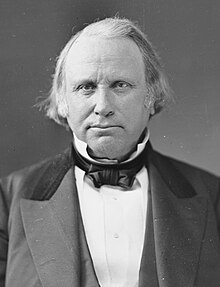Henry Wilson
| Henry Wilson | |
|---|---|
 |
|
| 18th Vice President of the United States | |
|
In office March 4, 1873 – November 22, 1875 |
|
| President | Ulysses S. Grant |
| Preceded by | Schuyler Colfax |
| Succeeded by | William A. Wheeler |
|
United States Senator from Massachusetts |
|
|
In office January 31, 1855 – March 3, 1873 |
|
| Preceded by | Julius Rockwell |
| Succeeded by | George S. Boutwell |
| Chairman of the Senate Committee on Military Affairs |
|
|
In office March 4, 1861 – March 3, 1873 |
|
| Preceded by | Jefferson Davis |
| Succeeded by | John A. Logan |
| President of the Massachusetts Senate | |
|
In office 1851–1852 |
|
| Preceded by | Marshall Pinckney Wilder |
| Succeeded by | Charles Henry Warren |
| Member of the Massachusetts Senate | |
|
In office 1844–1846 1850–1852 |
|
| Member of the Massachusetts House of Representatives | |
|
In office 1841–1842 |
|
| Personal details | |
| Born |
Jeremiah Jones Colbath February 16, 1812 Farmington, New Hampshire, U.S. |
| Died | November 22, 1875 (aged 63) Washington, D.C., U.S. |
| Nationality | American |
| Political party |
Whig Free Soil Know Nothing Republican |
| Spouse(s) | Harriet Malvina Howe (November 21, 1824 – May 28, 1870) (age 45) |
| Children | Henry Hamilton Wilson (1846–1866) Eva Wilson (born circa 1864–66) |
| Religion | Congregationalist |
| Signature | |
| Military service | |
| Allegiance |
|
| Service/branch |
|
| Years of service | 1843–1852 (Massachusetts Militia) 1861 (Union Army) |
| Rank |
|
| Commands | 1st Artillery Regiment (Massachusetts Militia) 3rd Brigade (Massachusetts Militia) 22nd Regiment Massachusetts Volunteer Infantry (Union Army) |
| Battles/wars | American Civil War |
Henry Wilson (born Jeremiah Jones Colbath; February 16, 1812 – November 22, 1875) was the 18th Vice President of the United States (1873–75) and a Senator from Massachusetts (1855–73). Before and during the American Civil War, he was a leading Republican, and a strong opponent of slavery. He devoted his energies to the destruction of the "Slave Power" – the faction of slave owners and their political allies which anti-slavery Americans saw as dominating the country.
Originally a Whig, Wilson was a founder of the Free Soil Party in 1848. He served as the party chairman before and during the 1852 presidential election. He worked diligently to build an anti-slavery coalition, which came to include the Free Soil Party, anti-slavery Democrats, New York Barnburners, the Liberty Party, anti-slavery members of the Native American Party (Know Nothings), and anti-slavery Whigs (called Conscience Whigs). When the Free Soil party dissolved in the mid-1850s, Wilson joined the Republican Party, which he helped found, and which was organized largely in line with the anti-slavery coalition he had nurtured in the 1840s and 1850s.
While a Senator during the American Civil War Wilson was considered a "Radical Republican", and his experience as a militia general, organizer and commander of a Union Army regiment, and chairman of the Senate military committees enabled him to assist the Abraham Lincoln administration in the organization and oversight of the Union Army and Union Navy. Wilson successfully authored bills that outlawed slavery in Washington D.C. and incorporated African Americans in the Union Civil War effort in 1862.
...
Wikipedia
